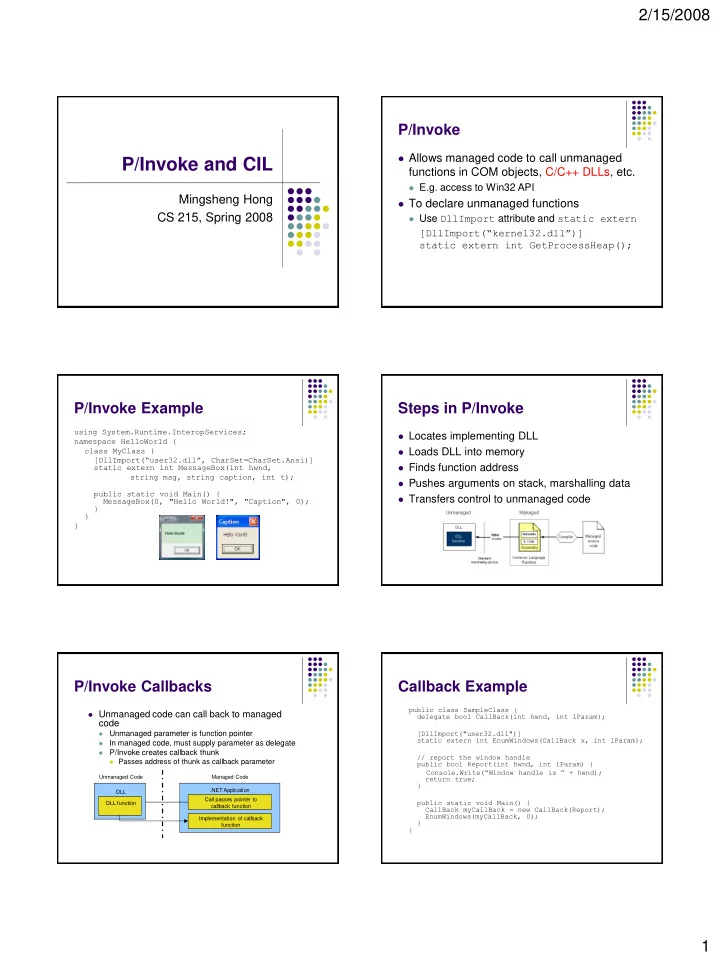

2/15/2008 P/Invoke Allows managed code to call unmanaged P/Invoke and CIL functions in COM objects, C/C++ DLLs, etc. E.g. access to Win32 API Mingsheng Hong To declare unmanaged functions CS 215, Spring 2008 Use DllImport attribute and static extern [DllImport(“kernel32.dll”)] static extern int GetProcessHeap(); P/Invoke Example Steps in P/Invoke using System.Runtime.InteropServices; Locates implementing DLL namespace HelloWorld { class MyClass { Loads DLL into memory [DllImport (“user32.dll”, CharSet=CharSet.Ansi)] static extern int MessageBox(int hwnd, Finds function address string msg, string caption, int t); Pushes arguments on stack, marshalling data public static void Main() { Transfers control to unmanaged code MessageBox(0, "Hello World!", "Caption", 0); } } } P/Invoke Callbacks Callback Example public class SampleClass { Unmanaged code can call back to managed delegate bool CallBack(int hwnd, int lParam); code Unmanaged parameter is function pointer [DllImport("user32.dll")] static extern int EnumWindows(CallBack x, int lParam); In managed code, must supply parameter as delegate P/Invoke creates callback thunk // report the window handle Passes address of thunk as callback parameter public bool Report(int hwnd, int lParam) { Console.Write(“Window handle is ” + hwnd); Unmanaged Code Managed Code return true; } .NET Application DLL Call passes pointer to public static void Main() { DLL function callback function CallBack myCallBack = new CallBack(Report); EnumWindows(myCallBack, 0); Implementation of callback } function } 1
2/15/2008 C++/CLI CIL Write managed C++ code Recall: two stage compilation compile with /clr C# compiler: C# code CIL code Just-in-time (JIT) compiler: CIL native code generates CIL from C++ new key words Common Intermediate Language __gc, __box, __typeof, __interface, __property very close to C# (and other OO languages) #pragma managed/unmanaged define classes, structs, inheritance, methods Very useful for native access to C++ libraries assembly-like statements build a “managed wrapper” CIL Hello World Example .assembly extern mscorlib {} //automatically added Stack language .assembly hello {} Compile with instead of registers, everything is from stack ilasm /exe /debug hello.il .class Program { .method static public void Main() cil managed { main operations take operands from stack .entrypoint //designates this method as the entry pt e.g. .locals init (string name) //create a local var int i = 137; 138 137 1 ldstr “World" //load the string onto eval stack 137 int j = 1; stloc.0 //store the string into the first local var int k = i + j; ldstr "Hello, {0}!" ldloc name //load local var onto eval stack call void [mscorlib] System.Console::WriteLine( string, object) //call method with stack items as params ret } } CIL Directives Load/Store Operations .assembly ldloc / stloc pushes contents of local var (or index) onto stack . class pops and stores in local var (or index) define any type ldc extends: extend some other type ldc.i4 50000 if extend System.ValueType , then value type ldc.i4.1 . method, .field, .property, .event ldc.i4.m1 .locals: names and types for local vars ldnull . entrypoint ldfld / stfld .maxstack ldsfld int32 A::fielda 2
2/15/2008 Load/Store Example CIL Operations .locals init ([1] int32 a, [0] int32 b) Integer operations ldc.i4.5 add, mul, sub, div, rem, neg stloc.0 ldc.i4 10 Boxing stloc.1 removes the value type from stack ldloc a creates an object on the managed heap that call void [mscorlib] boxes the value type System.Console::WriteLine(int32) places a reference to the newly created object ldloc b back on the evaluation stack call void [mscorlib] e.g. ldc.i4.3 System.Console::WriteLine(int32) box int32 Data type conversions: conv.* CIL Operations Control Flow Operations ceq/cgt/clt Construct objects newobj instance void A::.ctor() pop top two elements of stack check =, >, < Invoke functions call void [mscorlib] push true or false onto stack System.Console::WriteLine(string, object) br/beq/bne/bgt/blt/brfalse/brtrue call instance int32 A::F() callvirt instance int32 A::G() do the comparison and jump use to implement structured control flow Control Flow Example CIL Tools ldc.i4.3 CIL ldc.i4.1 binary cgt brtrue greater C# C# compiler ILDASM ILASM Native code ldstr "{0} is less than or equal {1}" code br end CIL textual greater: ldstr "{0} is greater than {1}" end: ldc.i4.3 Roundtripping box int32 ldc.i4.1 ildasm /out=new_program.il program.exe box int32 Edit the CIL code in new_program.il call void [mscorlib] ilasm newadd.il System.Console::WriteLine(string, object, object) 3
Recommend
More recommend